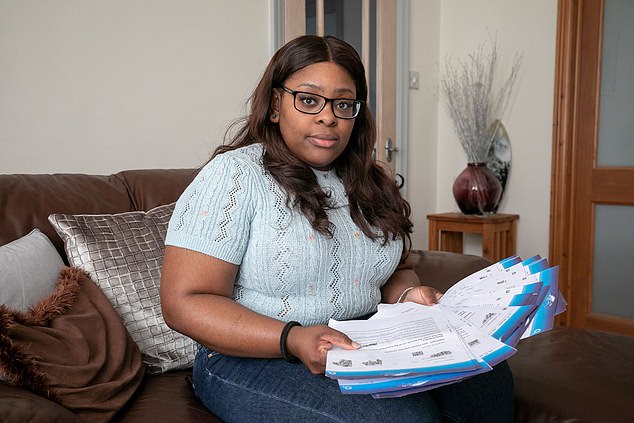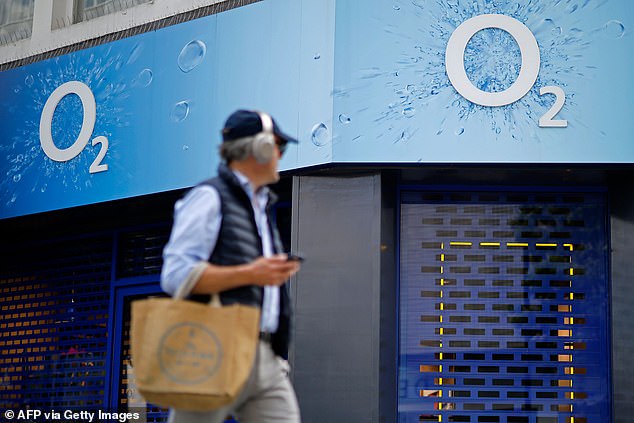Why is O2 still chasing fraud victims for iPhones they didn’t buy?
>
Tamara Reynolds had just begun preparing for Christmas Eve dinner when a letter arrived from a collection agency.
It said she owed £2,387 to mobile firm O2 and that her details had been sold to collection agencies, who could show up at her door at any time.
The 26-year-old administrative director from Croydon, south London, was terrified and furious.

Demands: Tamara Reynolds was told she owed £2,387 after fraudsters took four O2 mobile contracts, including two iPhone 13 phones bearing her name and address
Terrified at the idea of someone showing up to take her belongings. And furious because she didn’t owe O2 a penny – in fact, she’s never even been a customer.
That alarming Christmas Eve letter arrived almost two months after Tamara warned O2 that she had been the victim of identity fraud.
In November, she had discovered that fraudsters had taken out four mobile O2 contracts, including two iPhone 13 phones, using her name and address.
Tamara called O2 dozens of times in recent weeks to have the accounts closed, but the bills kept coming.
When she called O2 on Christmas Eve, it advised telling collection agencies that the payments were ‘under investigation’.
They “should” then leave her property, O2 promised.
“I was afraid someone would be at my door,” says Tamara. “This ruined my life and O2 didn’t seem to care.”
Tamara also discovered that her credit rating had been compromised. On Experian, her score nearly halved from an “excellent” 992 to a “very poor” 546 between October and December.
This would make it almost impossible for her to get a mortgage or borrow money from a regular lender. She says, “It affected so much of my life.
I thought about buying a house, but my financial advisor told me not to because no one wants to loan me right now, so it could only leave more marks on my credit file.
‘I was also supposed to top up my phone subscription before Christmas, but I wasn’t approved for that.’
After Money Mail intervened, an O2 spokesperson said it had updated Tamara’s credit file and would stop chasing her for payment.


Security: To open a contract with O2, you must provide a name, address and date of birth, as well as your bank details. You must also show proof of identity, such as a driver’s license or passport
But Experian said that while Tamara would now have a “good” rating, her score won’t immediately go back to “excellent.”
If Tamara’s case sounds familiar, it’s because Money Mail revealed in February last year that security flaws allowed fraudsters to sign O2 contracts in the name of innocent people.
Nearly a year later, we can reveal that the fraud loophole has still not been closed, with devastating consequences.
To open a contract with O2, you must provide a name, address and date of birth, as well as your bank details. You must also show proof of identity, such as a driver’s license or passport.
Other cell phone providers also ask for proof of address, such as a utility bill.
In Tamara’s case, she discovered that the crooks provided the wrong date of birth and bank account information (used for a credit check), but were still allowed to open four accounts in her name.
Jake Moore, global cybersecurity advisor for software company ESET, says: “The minimal details required to open a phone contract can be bought in bulk on the dark web. [a hidden part of the internet used by criminals] for just £1.’
Those who have had their identities stolen often only find out by receiving letters chasing overdue payments.
Shopkeeper Tracey Galbraith, her husband Chris and their 27-year-old son all received letters demanding payments from O2 last October. None of them had ever been a customer of the telecom giant.
They called O2 separately and found that their name and address had been used to purchase iPhone 13s in August.


Threats: Those whose identities have been stolen often only find out by receiving letters chasing overdue payments
They were assured that the contracts would be closed within 30 days. But last week, the Manchester family received a letter from collection agency Lowell, who had been instructed by O2 to collect a debt of £1,744.53 from 66-year-old Chris.
Tracey, 58, was starting to panic that they could be knocked on the front door at any minute.
When she called O2 to complain, she was told to escalate the complaint and wait for a response – which could take another four weeks.
Tracey says: ‘This has been an extremely troubling start to the year. We’re just so desperate to get it right.”
O2 is now investigating why Chris is being pursued by collection agencies. Tracey says: ‘The letter was a huge shock, but it got really worrying when we realized that O2 couldn’t recall the collection agencies.’ The family has since been offered a paltry £30 in damages.
David Byrne, from London, says he spent 30 hours on the phone with O2 customer service after delays in establishing his credit score put his job as chief financial officer in jeopardy. He must keep a blank record as part of company policy.
The 46-year-old saw his credit rating plummet to a ‘poor’ score due to repeated ‘missed’ payments on O2 contracts he never signed up for – again for iPhone handsets.
Despite reporting the fraud in early August, David says O2 continued to tell credit bureaus until December that he missed payments, and it still hasn’t corrected the errors. He says his details were also used to conclude Vodafone contracts, but Vodafone resolved the issue within 48 hours.
“People have ordered iPhones to be sent to completely different addresses under my name – it’s insane that they can get away with it,” says David.
A Virgin Media O2 spokesperson said: ‘We take fraud and security incredibly seriously and have prevented millions of pounds worth of fraudulent activity this year alone.
“We are committed to doing the right thing for victims – investigating cases, closing accounts quickly and always writing off debt when fraudulent activity is discovered.”
l.purkess@dailymail.co.uk
Some links in this article may be affiliate links. If you click on it, we may earn a small commission. That helps us fund This Is Money and use it for free. We do not write articles to promote products. We do not allow any commercial relationship to compromise our editorial independence.
